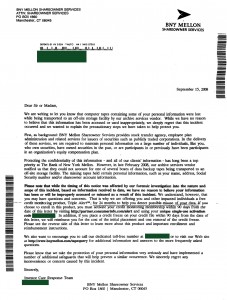An attorney friend of mine recently had a horrible experience following the theft of his wallet. He sent me the following advice with the request that I post it for you. To minimize your potential losses from credit theft, he recommends the following:
“1. Do not sign the back of your credit cards. Instead, put “photo identification required.”
2. When you are writing checks to pay on your credit card accounts, do not put the complete account number on the “memo” line. Write only the last four numbers. The credit card company knows the rest of the number, and anyone who might be handling your check as it passes through all the check processing channels should not have access to it.
3. Put your work phone number on your checks instead of your home number. If you have a post office box use that instead of your home address. If you do not have a post office box, use your work address. Never have your social security number printed on your checks. You can add it if it is necessary. But if you have It printed, anyone can access it.
4. Place the contents of your wallet on a photocopy machine. Do both sides of each license, credit card, each piece of identification in your wallet. You will know what you had in your wallet and all of the account numbers and phone numbers to call and cancel. Keep the photocopy in a safe place. I also carry a photocopy of my passport when I travel either here or abroad. We’ve all heard horror stories about fraud that’s committed on us in stealing a name, address, social security number, credit cards. Unfortunately, I, an attorney, have firsthand knowledge because my wallet was stolen last month. Within a week, the thieve(s) ordered an expensive monthly cell phone package, applied for a Visa credit card, had a credit line approved to buy a Gateway computer, received a PIN number from the Department of Motor Vehicles to change my driving record information online, and more.
5. We have been told we should cancel our credit cards immediately. But the key is having the toll free numbers and your card numbers handy so you know whom to call. Keep those where you can find them.
6. File a police report immediately in the jurisdiction where your credit cards, etc., were stolen. This proves to credit providers you were diligent, and this is a first step toward an investigation (if there ever is one). But here’s what is perhaps most important of all (I never even thought to do this):
7. Call the three national credit reporting organizations Immediately to place a fraud alert on your name and also call the social security fraud line number. I had never heard of doing that until advised by a bank that called to tell me an application for credit was made over the Internet in my name. The alert means any company that checks your credit knows your information was stolen, and they have to contact you by phone to authorize new credit. By the time I had been advised to do this, almost two weeks after the theft, all the damage had been done. There are records of all the credit checks initiated by the thieves’ purchases, none of which I knew about before placing the alert. Since then, no additional damage has been done, and the thieves threw my wallet away this weekend (someone turned it in). It seems to have stopped them dead in their tracks. The following are the numbers you always need to contact when your wallet, credit cards or other personal identifying information been stolen:
- Equifax: 800-525-6285
- Experian (formerly TRW): 888-397-3742
- Trans Union : 800-680-7289
- Social Security Administration (fraud line):800-269-0271″



